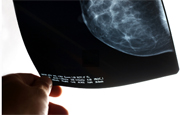
TUESDAY, Nov. 27 (HealthDay News) — Women with dense breasts who undergo routine mammograms would be open to additional screening tests for breast cancer, a new study finds.
The researchers found these women would welcome other tests even if they were invasive, more costly and could result in false positives.
Previous studies have shown that women with dense breasts are at greater risk for breast cancer. Dense breast tissue, however, is indistinguishable from tumors and other abnormalities on mammogram because both appear white. As a result, breast cancer can be difficult to spot in dense breasts in its early stages when the disease is more treatable.
The researchers questioned 105 women undergoing a routine mammogram at a radiology clinic. The women were asked if they knew whether or not they had dense breast tissue. After informing the women about the link between dense breasts and breast cancer, they were asked if they would be interested in additional screening for breast cancer, such as automated whole-breast ultrasound or contrast-enhanced mammography, if they were told they had dense breasts.
The study revealed 76 percent of the women did not know if they had dense breasts. Most of the women, the researchers noted, were open to additional breast cancer screening even if it involved out-of-pocket costs or a biopsy.
The research was to be presented on Tuesday at the Radiological Society of North America (RSNA) annual meeting, in Chicago.
“Our study highlights the need for patient education regarding breast density,” Dr. Jafi Lipson, an assistant professor of radiology at Stanford University School of Medicine in California, said in an RSNA news release.
Lipson performed the study along with Dr. Haatal Dave, resident physician at Yale University School of Medicine.
“We hope this study raises awareness that dense breast tissue is a risk factor for breast cancer and that alternative technologies, including automated whole-breast ultrasound and contrast-enhanced mammography, are available to aid in screening women with dense breasts,” Dave said in the news release.
The study authors stated that the public should be informed about breast density and the increased risk for breast cancer. They pointed out that five states, including Connecticut, New York, Texas, California and Virginia, passed laws requiring radiologists to tell women if they are found to have dense breasts. Legislation is currently pending in 10 other states.
Research presented at medical meetings should be viewed as preliminary until published in a peer-reviewed journal.
More information
The U.S. National Cancer Institute has more about breast density and mammograms.
